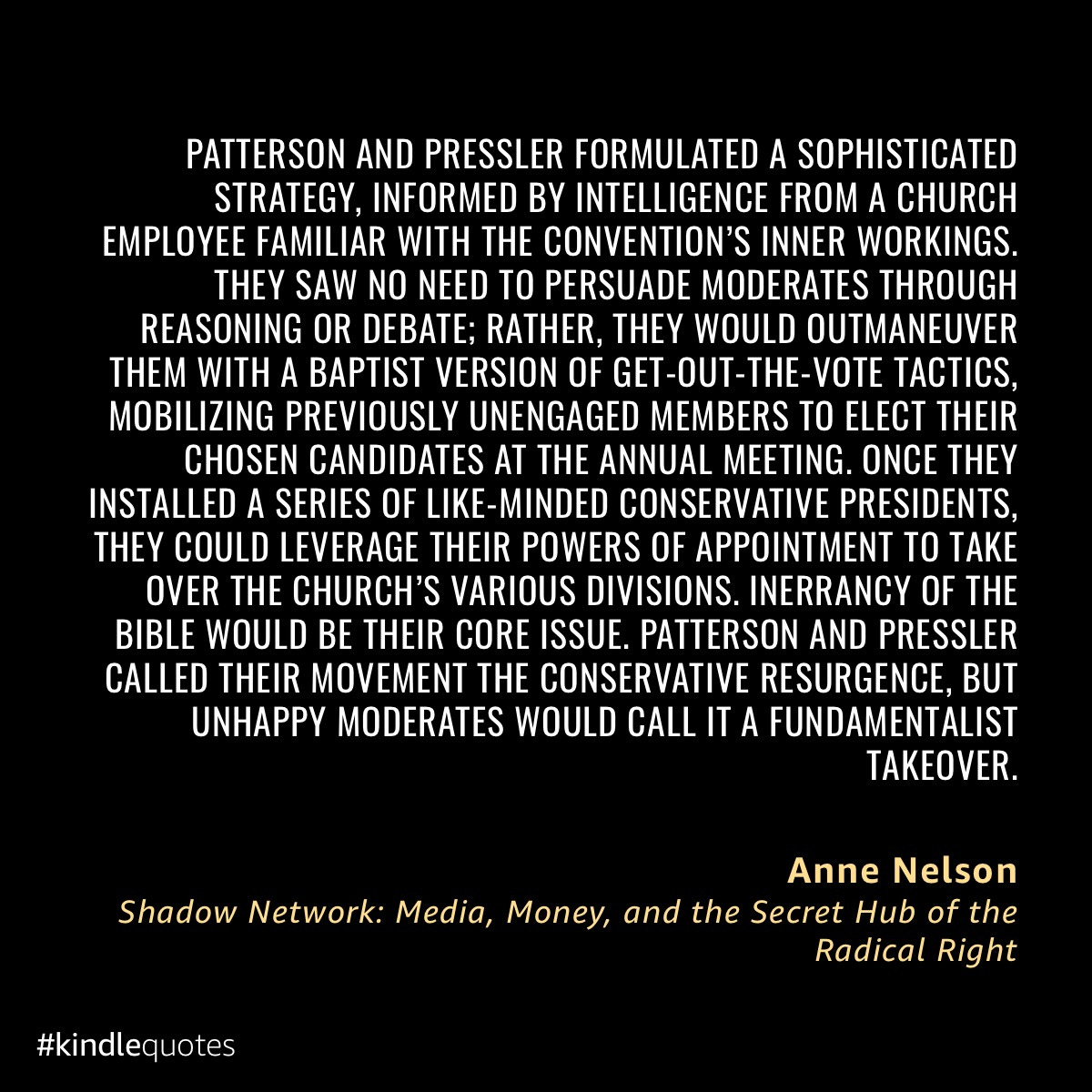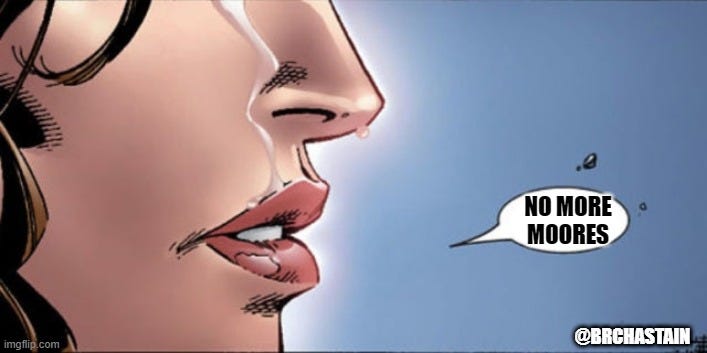#SBC21 & The New Conservative Resurgence Among Southern Baptists
As more people say ‘bye & bye’ to the SBC, the unbroken circle of accepted orthodoxy tightens.
Hello, readers. It’s been a busy spring - I’m working on a book proposal and some other behind the scenes work I’ll be announcing in the next month.
CW: mention of sexual abuse, racism.
The Southern Baptist Convention is a bellwether for white American evangelicalism. Its resources, reach, political clout (and deep integration into GOP machinery), and cultural influence have a direct impact on the lives of 14.5 million Southern Baptists.1 That impact reverberates even further when one considers the extended reach of media created by Southern Baptist presses, celebrity pastors, and other affiliates among smaller denominations and independently operated churches.
This week, the SBC will meet for their annual convention. While there, a conservative group of pastors will seek to “Take the Ship,” and steer the denomination ever further to the right. From The New York Times:
Next week more than 16,000 Southern Baptist pastors and leaders will descend on Nashville for their first annual meeting of the post-Trump era. It is their most high-profile gathering in years, with attendance more than double the most recent meeting in 2019, after a pandemic cancellation last year. It caps months of vicious infighting over every cultural and political division facing the country, particularly after the murder of George Floyd.
The outcome has the potential to permanently split an already divided evangelical America. Like the Trump movement within the Republican Party, a populist groundswell within the already conservative evangelical denomination is trying to install an anti-establishment leader who could wrench the church even further to the right, while opponents contend that the church must broaden its reach to preserve its strength. For three days, thousands of delegates known as “messengers” — most of them white men — will fight over race, sex and ultimately the future of evangelical power in the United States.
Whether these pastors are aware of it or not, the decisions they are making this week echo similar events forty years ago. There are other historical through-lines of abuse & racism to track as well.
Let’s take a look.
Conservative Resurgence Redux
This is not the first time such a group has sought to overtake the SBC.
The Conservative Resurgence in the SBC was spearheaded by two men, Paul Pressler & Paige Patterson. As described by Anne Nelson in her book Shadow Network, they began coordinating their campaign over concern “about their church’s alarming lurch toward liberalism.”2 So they devised a plan:
They were successful. Notably, they found ways to motivate people to go to great personal lengths to support their cause. Nelson continues:
“Their crusade began in earnest in 1979, with a churchwide get-out-the-vote campaign. Volunteers from fifteen states were recruited to attend the convention in Houston, where they voted as a bloc to elect conservative Florida-born pastor Adrian Rogers as president. The following year Pressler declared his intent to install a conservative president every year for the next decade using the same tactics. “I remember one family from South Bend, Indiana,” he recalled. “They had five children and drove non-stop to Los Angeles to the Southern Baptist Convention in 1981. They voted and drove non-stop back, eating peanut butter and jelly sandwiches. They didn’t spend a night in a motel because they didn’t have the money.” 10 A moderate Baptist pastor named Will Campbell described the outcome. “Year after year thousands of messengers poured into Dallas, Miami, St. Louis, Atlanta, San Antonio, Las Vegas for the annual gathering. They came in cars, church buses, recreation vehicles, airplanes, and on trains to cast their ballots. Each year the Pressler-Patterson faction won. The mission was accomplished.”
We’ll come back to Pressler & Patterson in another post. For now, let’s turn to more recent events—the departures of Beth Moore & Russell Moore (no relation).
No More Moores
In March, Beth Moore left the SBC & its publishing wing Lifeway, stating: “I am still a Baptist, but I can no longer identify with Southern Baptists,” Moore said in the phone interview. “I love so many Southern Baptist people, so many Southern Baptist churches, but I don’t identify with some of the things in our heritage that haven’t remained in the past.” A long-time Bible teacher (whose books, DVDs, and related student and leader guides were significant sources of revenue for LifeWay), she had come under fire for her criticism of Trump as well as some statements related to the ongoing sex abuse scandals in Southern Baptist churches.
Last month, Russell Moore also made his exit. Russell Moore led the Ethics & Religious Liberty Commission of the SBC and had come under fire in recent years for his criticism of President Trump. Following his exit, a letter he had written to SBC insiders (specifically, the Executive Committee and Board of Trustees for the ERLC) were leaked to Religion News Service.
The letter is damning, while also being a quintessential example of the delicate dance between the raindrops that moderates must do in fundamentalist denominations. Moore expresses his Baptist bona fides:
“This past week all I could think about was the Jordan River. This is because I realized that the twentieth of this month was the thirty-seventh anniversary of my baptism at Woolmarket Baptist Church, my home congregation in Biloxi, Mississippi. I remember that day well.”3
He also expresses his conviction in the inerrancy of Scripture, then continues to express his concern for injustice being motivated by fear of hell:
“I am called a liberal—someone who believes in the inerrancy of Holy Scripture, in the authority of Holy Scripture, someone who has spent my life defending such concepts as the exclusivity of Christ for salvation. I am a “liberal” in this definition not because I deny the inerrancy of Scripture but because I affirm it. I believe in the inerrancy of all Scripture — including Luke 10 and Ephesians 2 and 3 and Romans 12, and all of it. I believe that no sin — including sins of sexual immorality or racial hatred (emphasis mine)— can be forgiven apart from the blood of Christ and repentance of such sins.
My concern about such issues is not because I believe in “social justice” (although, in the literal meaning of those words, of course I do, as the major and minor prophets tell us), but because I believe in the doctrine of hell. I believe in standing against racism not just because I love our African-American and Hispanic and Asian-American and immigrant brothers and sisters in Christ (although I certainly do), but also because I love bigots. And I believe that unrepentant sin, not brought to the light of Christ and cleansed by the blood of Christ, through the gospel, leads to hell. I really believe in hell. That’s why I’ve been clear for twenty-five years on abortion, on sexual chastity and morality, and on racism.”4
By these measures, Russell Moore is unwaveringly Baptist. But through the course of the 2016 election cycle and the duration of Trump presidency, he was increasingly isolated. In this leaked letter, however, Trump was not the focus. As the quote above indicates, the internal issues of sexual abuse & racism within Southern Baptist churches were what had led to Moore being targeted by militant factions in the SBC. The letter is long and worth a read, but this final quote below indicates his exasperation in trying to work within the denomination to affect change:
“From the very beginning of my service, I have been attacked with the most vicious guerilla tactics on such matters, and have been told to be quiet about this by others. One SBC leader who was at the forefront of these behind-closed-doors assaults had already ripped me to shreds verbally for saying, in 2011, that the Southern Baptist Convention should elect an African-American president. This same leader told a gathering that “The Conservative Resurgence is like the Civil War, except this time unlike the last one, the right side won.” I walked out of that gathering, as did one of you.”5
Conservative vs. Ultraconservative
Yesterday, The Washington Post framed this year’s convention as a “great reckoning:”
“The newest Southern Baptist battle does not pit liberals against conservatives nor Democrats against Republicans. Instead, it mostly pits theological conservatives against those who are ultraconservative in a struggle for powerful positions within a denomination of 14 million people.”6
A key figure in this battle is Mike Stone, an “outsider candidate” who has lobbied hard to keep the SBC from interrogating either its historical or contemporary racism—vilifying CRT (critical race theory) as somehow antithetical to the gospel, even at the expense of traumatizing, offending, and causing a schism with a sizable Black population within the Southern Baptist Convention. The same fear of retribution that plagued Russell Moore is evident:
“Stone has complained that SBC leaders have bent over backward to apologize for the exit of several Black pastors over the leaders’ rejection of critical race theory (CRT), a framework academics use to understand systemic racism in the United States. Normally the presidency goes to a respected leader who has not campaigned, but several people who work at SBC institutions who did not want to be identified for fear of losing their jobs said Stone has been flying around in a private jet to garner support.”7
At 2:15 pm today, the vote for SBC will take place. We will soon see if the ship has been taken.

https://www.nytimes.com/2021/06/12/us/southern-baptists-conservatives.html
Shadow Network by Anne Nelson.
https://religionnews.com/2021/06/02/russell-moore-to-erlc-trustees-they-want-me-to-live-in-psychological-terror/
Ibid.
Ibid.
https://www.washingtonpost.com/religion/2021/06/14/southern-baptist-reckoning-race-gender-abuse/
Ibid.






